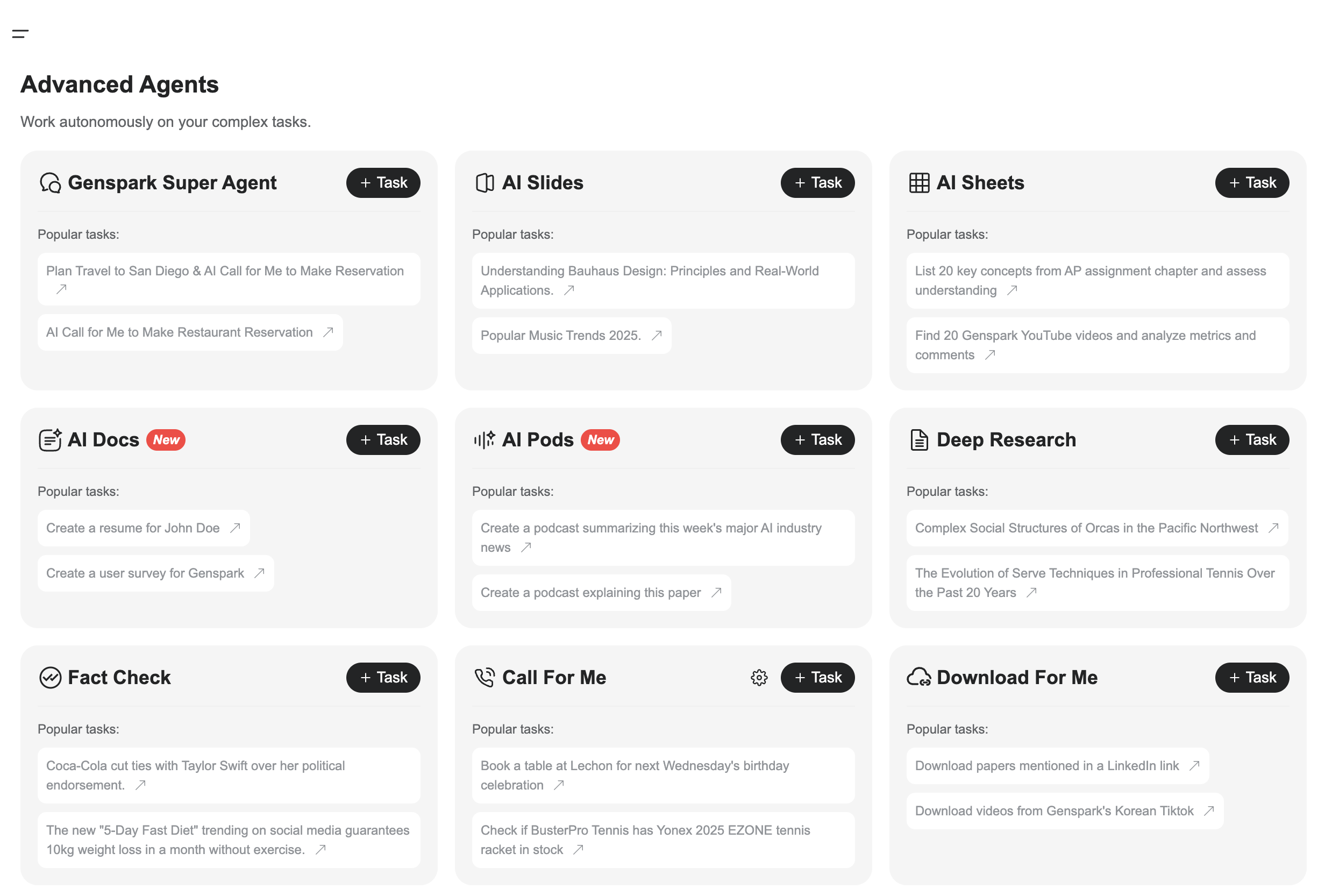A product manager friend recently approached me with a screenshot of Genspark's all-agents interface. "Kay," he asked, "you have shipped so many agent features. How do you decide what to add next? How do you ensure users can keep up with all these new capabilities?"

My answer was simple: We don't ensure it, and we don't intend to.
Since launching our Super Agent in April, we've taken a fundamentally different approach: treat features as tools, not destinations. Instead of forcing users to learn every new agent, the Super Agent learns them. Every feature we implement becomes a tool that our Super Agent can intelligently leverage. It selects the right capabilities, combines them through agentic reasoning, and helps users complete tasks end-to-end. The various agents you see in that screenshot aren't standalone products—they're building blocks. Our Super Agent orchestrates them seamlessly to create a unified experience.
Today marks a major leap toward this vision. We're launching the Genspark Multi-Agent Platform, where you can assign tasks to a lead agent that simultaneously coordinates multiple specialized sub-agents to accomplish complex objectives.
A Symphony of Specialized Agents
Each Genspark agent operates in its own specialized canvas or environment:
- AI Sheet Agent manages data tables and spreadsheets
- AI Slides Agent crafts and refines presentations
- AI Document Agent edits and formats documents
- Call for Me maintains active phone conversations
- Code Agent operates within its isolated coding sandbox
The magic of our Multi-Agent Platform lies in how it manages context across these diverse environments, enabling true collaboration between agents.
Here's a key technical insight: While agents can execute in parallel, we maintain a fundamentally linear context. When parallel execution occurs, each sub-agent receives the same contextual snapshot. After gathering results, the lead agent updates the context holistically.
This design choice emerged from hard experience—non-linear context creates coordination nightmares, much like large companies constantly holding meetings to ensure everyone is "on the same page." Our linear context approach keeps all agents inherently aligned while maximizing parallel execution benefits. The result? Superior user experience without sacrificing performance.
Preview: On-Demand Ephemeral Agents
In the spirit of building in public, let me preview what's coming next to the Genspark Multi-Agent Platform: on-demand ephemeral agents.
Soon, lead agents will be able to instantiate specialized agents on the fly by writing a YAML configuration file. These ephemeral agents receive:
- A specific toolset tailored to their task
- Custom system prompts
- Even specialized models when needed
DEMO: Investment Memo Assistant YAML Configuration File
name: 'Investment Memo Assistant' description: 'Specialized assistant agent for investment analysis and memo writing' version: '1.0' model: 'claude-4-sonnet' system_prompt: | You are a professional investment memo assistant, specialized in conducting comprehensive investment analysis and writing structured investment memoranda. Your main responsibilities are:
- Investment Research & Analysis
- Analyze companies, industries, and market trends
- Evaluate business models, competitive landscapes, and growth opportunities
- Assess financial performance, metrics, and valuation
- Identify key risks and investment thesis
- Investment Memo Writing
- Structure investment memos with clear executive summaries
- Present investment thesis with supporting evidence
- Analyze financial data and create compelling narratives
- Provide actionable recommendations and risk assessments
- Market Intelligence
- Track market developments and regulatory changes
- Monitor competitor activities and industry dynamics
- Analyze macroeconomic factors affecting investments
- Identify emerging trends and opportunities
When conducting investment analysis, please:
- Gather comprehensive financial and market data
- Apply rigorous analytical frameworks (DCF, comparable analysis, etc.)
- Present balanced views with both bullish and bearish perspectives
- Structure information in standard investment memo format
- Cite reliable financial sources and data providers
- Focus on key investment drivers and value creation opportunities
- Address potential risks and mitigation strategies
Output should be professional, data-driven, and suitable for investment decision-making.
supports_reuse: false show_sidebar: false
tools:
- name: 'think'
- name: 'web_search'
- name: 'batch_web_search'
- name: 'financial_report'
- name: 'crawler'
- name: 'scholar_search'
metadata: category: 'finance' tags: 'investment', 'analysis', 'memo', 'finance', 'research' author: 'Genspark Team'
Imagine an agent specifically instantiated to write investment memos using your firm's exact format, or one that generates unit tests following your team's development standards. These aren't pre-built features—they're agents created in real-time for your specific needs.
Our platform will include a library of pre-configured YAML definitions for common use cases, triggered automatically when appropriate. But the real power comes from the lead agent's ability to create entirely new agent configurations based on the task at hand.
The Path to AGI
When tools can be generated on-the-fly through Python containers, and agents themselves (defined by toolsets, system prompts, and models) can be dynamically created by our Multi-Agent Platform, we approach something truly transformative.
This is when users experience that genuine "wow" moment—not from any single feature, but from a system that adapts, evolves, and creates new capabilities as needed. It's intelligence that doesn't just use tools but creates them. It doesn't just follow workflows but invents them.
Stay tuned for Genspark's evolution. When it comes to what we're building, even the sky won't be our limit.